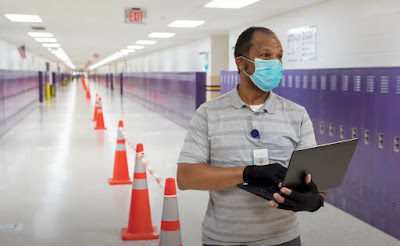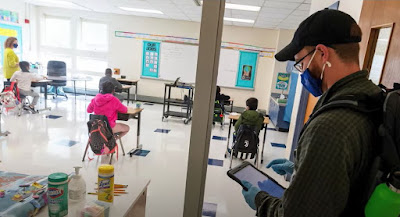FCPS offers more details on the return to in-person learning
 |
| School staff prepare for the return to school. [Photos from an FCPS video] |
Fairfax County Public Schools Superintendent Scott Brabrand offered more details on the return-to-school process at a town hall on Feb. 10.
Groups of students will return to school buildings on a phased-in schedule, starting with certain special education and career and technical education students on Feb. 16. All groups will be back in class by March 16; the final group is grades 3-6. Some groups are already back in class, and all students have the option of remaining with all-virtual learning.
In-person learning
Students who elect to come back will have two days of teacher-led instruction in class and two days of teacher-led instruction at home. Those who stay with virtual learning will have four days of teacher-led instruction at home, Tuesday through Friday. One day a week is set aside for asynchronous learning.
In-person and at-home students will have the same schedule and the same instructional program through the concurrent learning model. A new bell schedule takes effect Feb. 16.
To help reduce COVID infections, students in middle and high schools will be asked not to use lockers and instead bring a backpack with all their supplies.
Seating capacity on buses will be reduced, with certain seats blocked off. Students will be required to wear face coverings on buses.
Related story: Fairfax County School Board approves return-to-school plan
Tawanya Scarboro, a kindergarten teacher at Colvin Run Elementary School in Great Falls, who participated in a concurrent learning pilot program in the fall, said her students “did a remarkable job” adhering to the FCPS and CDC guidelines. “Children had a seamless transition from the all-virtual to the hybrid model,” she said. “They were excited to learn and be back in class.”
During recess, they played outside while maintaining social distancing and enjoying such activities as paper airplane competitions and hopscotch.
Families who want to switch from in-person learning to virtual learning should call the school counselor, said Carlyn Floyd, principal of Woodson High School in Fairfax. That will be easily approved. However, switching from all virtual to in-person learning is more challenging, as classroom capacity might be full.
Classroom monitors
Fairfax County is hiring hundreds of monitors to help out in classrooms. According to Brabrand, FCPS is funding that program through savings from cutting back on substitute teachers during all-virtual learning.
He said only about “a couple thousand” of FCPS’ 15,000 teachers have been excused from in-person teaching due to accommodations under the ADA (Americans with Disabilities Act).
Brabrand expects many of the teachers who had planned to stay virtual will want to come back to the classroom.
A community member who called in to the town hall asked why not wait until all teachers and other school staff get COVID vaccinations.
The CDC has never called for the return to school to be linked to vaccinations, Brabrand responded. FCPS worked with the Fairfax County Health Department to prioritize school staff for vaccinations, but vaccinations “are just one more tool in the toolbox,” along with other mitigation strategies.
A parent who said she is part of the Open FCPS movement said teachers are “bullying students,” telling them not to return to school. She asked Brabrand to tell teachers “to stop this outrageous behavior.”
Brabrand declined, saying “I don’t want to judge all teachers by a comment from one teacher. . . . We want parents to make the choice. We need to make sure we’re respecting there are different points of view.”
Support for students
Brabrand said FCPS is considering expanding summer school options for students who have struggled academically with online learning.
Woodson High School in Fairfax is using the online intervention period to reach out in small group settings to help students who need extra help, said Floyd.
Fran Lewandoski, a social worker at Lemon Road Elementary School in Falls Church, said the return to in-person learning will make a big difference in having counseling staff better connect with students and help those who need special attention.
In recent months, “we did door visits,” she said, with social workers going to students’ homes and staying outside for meetings with families through a screen door.
Brabrand hopes seniors will be able to have a “normal or near-normal graduation ceremony.” He is waiting to see if the state’s cap on 250 people at an outdoor gathering will be lifted by graduation season.
For the next school year, Brabrand expects FCPS will move to in-school learning five days a week, but might continue to offer a virtual learning option.


